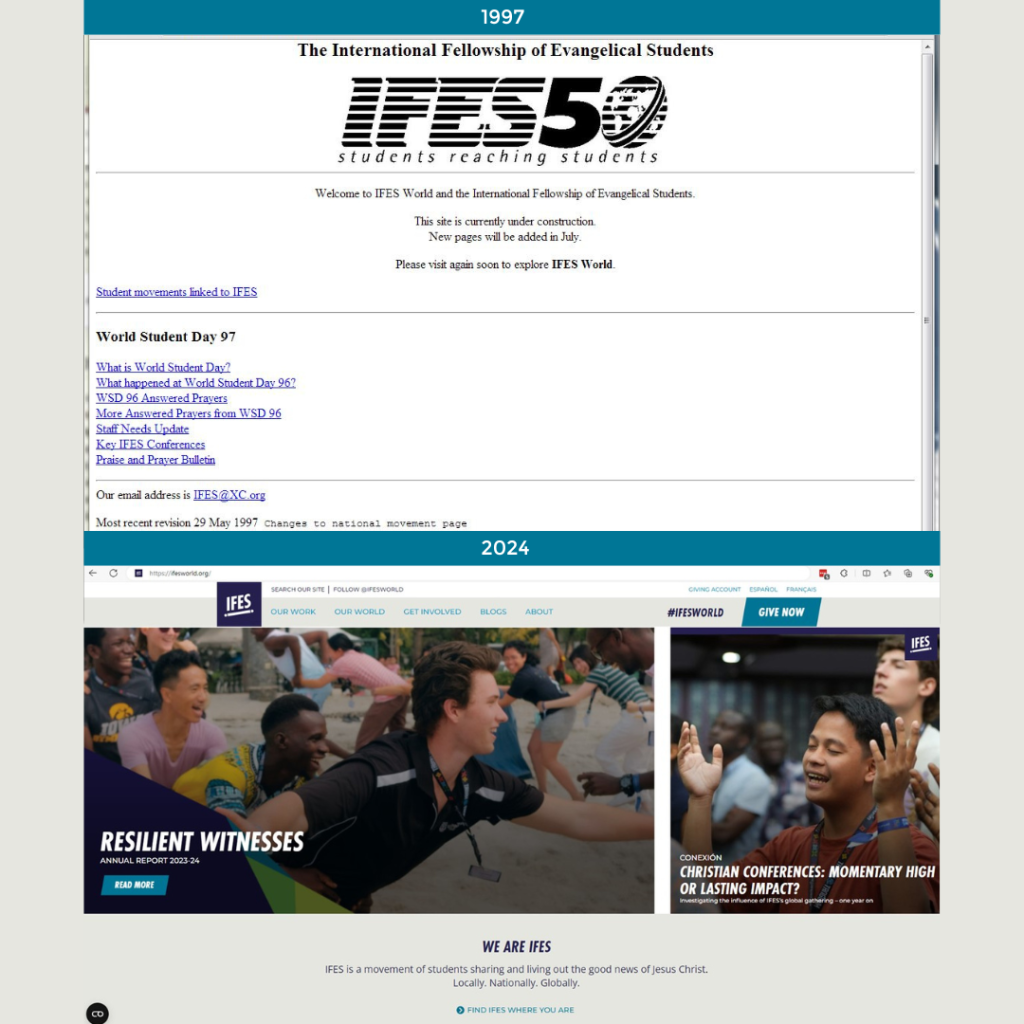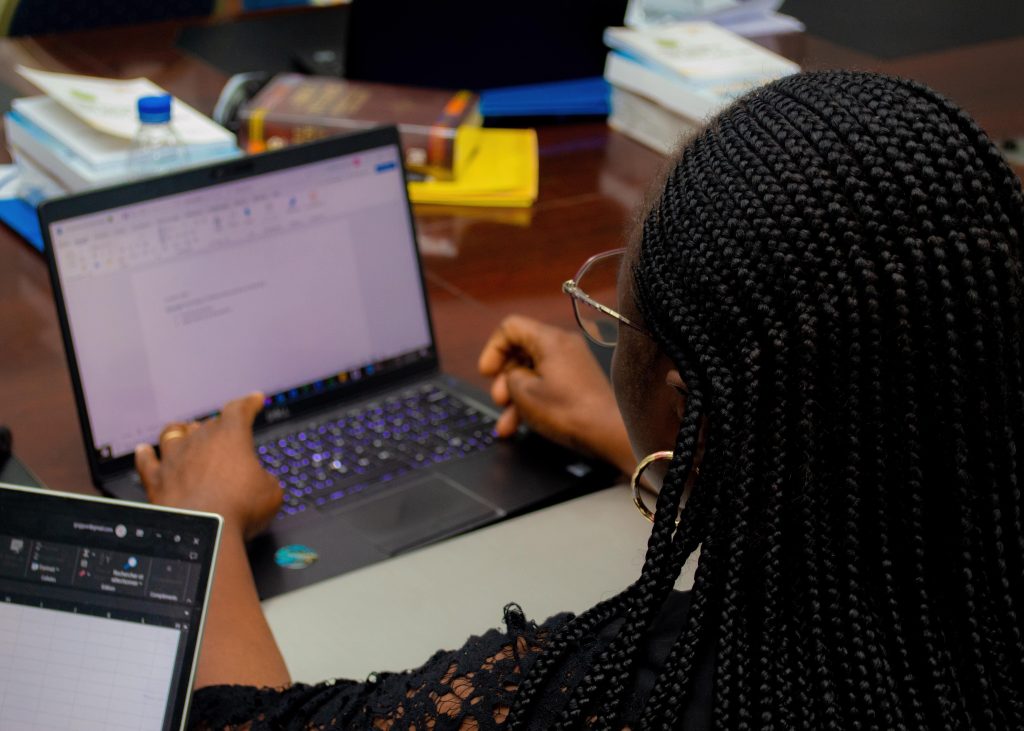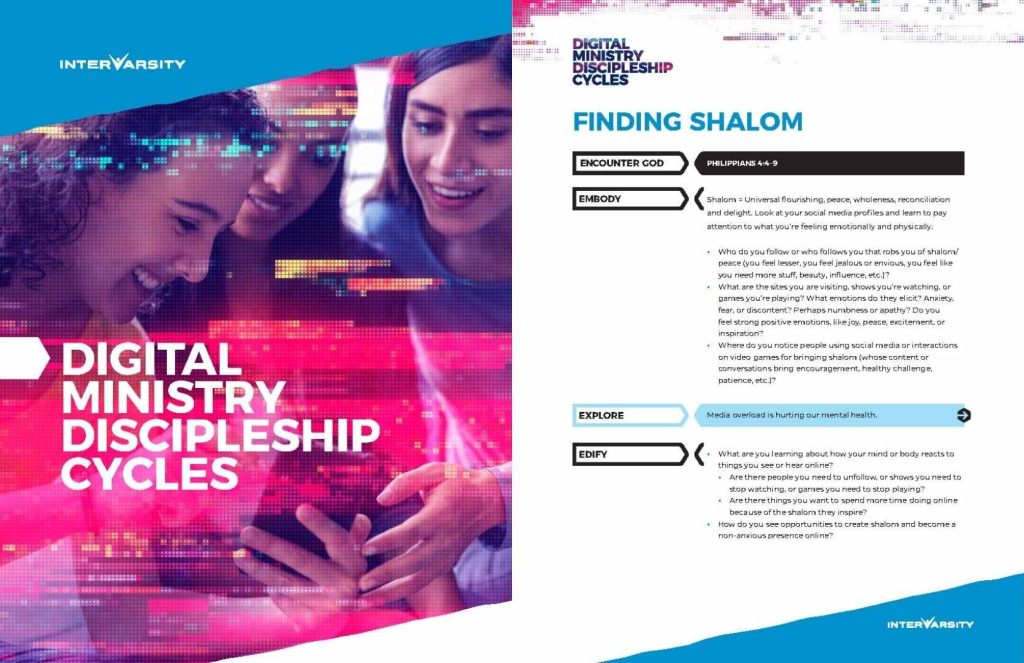
Student Ministry in a Digital Age
Utilising technology to reach and equip digital natives
You are one of five and a half billion people using the internet.
Scrolling news feeds, streaming TV shows, and shopping online are probably an integral part of your life. Through subconscious adaptations and conscious choices, you are part of the digital age.
But what does Christ think about the adaptations and choices we make?
And how can student ministry thrive in this “new world”?
These are vital questions. Today’s students are not just digital natives but also social media natives.
In a recent survey of IFES national movements, a third said digital ministry is a focus area. Yet almost two-thirds of all respondents said they require support in it.
So, how has digital engagement across IFES evolved and how can we fully utilise new technologies?
What support can we offer each other so that university students are reached and equipped in this digital age?
THE EVOLVING DIGITAL PRESENCE OF STUDENT MINISTRY

Most Christian ministries have adopted digital technology to be present in the digital space.
When the internet became more widespread and accessible in the late 1990s, IFES and some of its national movements launched websites.
Initially text heavy, these have evolved into informative and visually attractive platforms for showcasing ministry – like GBU Spain’s.
With the emergence of social media, Facebook pages were created, later followed by Instagram accounts. Some movements, like Perkantas Indonesia, are now present on TikTok. And earlier this year IFES launched its own WhatsApp channel.
But the evolving use of technology for presence and engagement has been far from uniform.
Many movements in Africa prefer to post on a Facebook page rather than maintain a website. This perhaps reflects not just the extra cost and work involved in websites but also that today’s students are less interested in them.
Moreover, movements in Latin America, like CECE Ecuador, tend to have higher engagement on Instagram than Facebook. And a recent poll on the IFES WhatsApp channel indicated that it has fewer subscribers from Eurasia, where Telegram is more popular.
This cautions us against any one-size-fits-all approach. It should encourage movements to think strategically about developing their presence on platforms that are most relevant in their context.
E-MINISTRY OR DIGITAL MINISTRY?
Beyond ministry presence, forms of student ministry have also evolved into digital formats.
Take something as simple as recordings of inspirational talks at IFES conferences. They’ve made their way from being locked in the limited reach of a cassette tape to being ubiquitously available on Voices of IFES podcasts and the IFES YouTube channel.
that can only be a good thing. (And keep a look out for old IFES talks that have recently been digitised.)
Traditionally delivered in person, training is now widely offered online.
Many of IFES’s resource ministries use e-learning, such as courses about engaging the university, understanding Scripture, and developing good governance.

The IFES Logos and Cosmos Initiative (LCI) in Latin America and Francophone Africa uses Moodle for assignments, projects, and feedback as well as Zoom for monthly and quarterly seminars and workshops.
In a global fellowship this is invaluable. Digital technology enables students and staff from different countries around the world to meet, learn, and share together in a way that would not be otherwise possible.
The Scripture Engagement team conducts online calls with their “multipliers” four times a year, with 17 participants from 16 countries across nine IFES regions.
Nevertheless, we might agree with Ricardo Borges, Secretary for Scripture Engagement, when he wonders, “I’m not sure if I can call it ‘digital ministry’”.
The adoption of digital tools to simply do what we were already doing might better be described as e-ministry. Just like mail became “e-mail” and courses turned into “e-courses”, online meetings are essentially “e-meetings” and YouTube talks “e-talks”.
But shouldn’t digital ministry be more?
How can the opportunities afforded by digital technology shape what we’re doing – or enable us to do something we weren’t?
DIGITAL MINISTRY IN THE DIGITAL AGE
It turns out that a recent experiment with the e-learning course “Foundations of Scripture Engagement” is a good example of how the medium can shape content. The team ran two trial courses with very different groups – LCI participants from eight countries across Francophone Africa and FES Singapore staff.
The innovation was that participants were able to adapt and supplement the course content and adjust its length. Ricardo notes that “it was positive to see how they could utilise the flexibility of the e-learning program to shape a course that better fitted their context.”
In the LCI, WhatsApp proved to be a vital supplement to the Moodle courses and Zoom meetings.
As a group of geographically distant people, the team knew that fostering community while learning was going to be a challenge.
But over time, a dozen very active regional and task-based WhatsApp groups sprung up. Learners and leaders could share experiences and knowledge – and friendships were built. This hybrid approach has facilitated a deeply relational learning experience.

In recent years, InterVarsity Canada (IVCF) have been considering the transition from ministry to e-ministry and the need to affirm and develop digital student ministry. Sanjana Daniel, IVCF Digital Ministry Specialist, explains:
“We coach those who are leading youth and young adults about how they can have helpful and nuanced conversations about the use of digital technology in discipleship. This is mostly done by connecting core competencies – showing them that what has always been true of discipleship and ministry is still true, but that those skills need to be honed in a new direction. One of the resources we offer is a set of discipleship cycles that are specifically designed around aspects of tech-mediated spiritual formation.”

This considered yet positive approach grapples with a fundamental question: how can we critically assess our digital context so that we neither blindly adopt it nor fail to grasp its opportunities?
That’s also the impetus behind a suite of digital ministry papers published for this year’s Lausanne conference.
WISELY UTILISING OPPORTUNITIES OF THE DIGITAL AGE
For Sanjana, “digital discipleship” is essential. She is passionate about helping students treat life online as part of our whole-life experience and discipleship, rather than as a disembodied other part. In this way, IVCF students consider deeper issues of identity, worth, relationships, and discourse. They are challenged to embrace a thoughtful approach – neither demonizing tech nor being consumed by it. She says this is making them more hopeful:
“One student admitted that the feeling she mostly associates with using her phone is shame. But this conversation has encouraged her to pray about that rather than just accept it and view the realities of modern life with more nuance and grace for herself.”
To support students in their engagement with digital technology, IVCF have curated a collection of online resources.
Maéva Frair, Senior Media Producer at IFES, is also enthusiastic about utilising digital media to shape content that appeals to social natives. In recent years, she has been developing Reels for IFES on Instagram.
She sees their immediate value and strategic potential:
“In this new digital world, everything must be fast. With our short attention spans, we don’t easily take time to read or listen to something. So, our goal is to create accessible content for everyone by giving them small glimpses of something bigger. If students get interested by a one-minute Reel, then they may be willing to access longer pods, articles, and videos.”
LEVERAGING THE DIGITAL AGE: FROM USE TO UTILISATION
Whether it’s ministry presence, tools, discipleship, or outreach, what we see is that good digital ministry involves creative and thoughtful exploitation of technology.
It moves beyond a passive, unthinking use – beyond an “e-ministry” approach – to an active utilisation that meets specific needs and opens up new opportunities.
The boundary between use and utilisation can be fluid – as shown by the Scripture Engagement team’s experience with their e-learning course. What matters is the intention to leverage technology to enhance ministry.
This is one of the aims of IFES Connect – an online community for national movement staff, IFES staff, supporters, and students.
It was launched to meet the need for a digital space for collaboration, conversation, and direct resource sharing across IFES. This community enables users to follow news and events, contribute to forums, access resources, and offer prayer requests.

The proactive utilisation of technology also requires an overarching methodology and coordinated strategy.
Over the next few years, the DIGITAL243 project (243 after Proverbs 24:3) will be working with movements and ministries across IFES. It will help connect needs and provide expertise so that digital opportunities can be leveraged.
John Bagg, who heads up the project, says it represents a shift in thinking:
“I hope that DIGITAL243 will mean that others see IT services not just as a ‘service provider’ but as a ‘ministry partner’”.
INTO THE FUTURE OF THE DIGITAL AGE
The five and a half billion internet users will soon be six. If the gospel is to reach natives of all places, then we must reach and equip natives of digital spaces.
That will require conscious choices – a thoughtful and prayerful utilisation of technology rather than subconscious adjustments or negative knee-jerk reactions.
As you discern your own needs, context, and opportunities, Roja Mathew Jacob, Digital Engagement Specialist at IFES, reminds us of the ultimate goal:
“My vision for digital ministry is to help students encounter Christ in their online lives. Through creative content, authentic connections, and thoughtful engagement, IFES can reach and equip students globally, empowering them to grow in faith and become digital disciples who share Christ’s love in their online communities.”

Do you have an inspiring story of digital student ministry to tell – or more questions about digital ministry?
Share it with your global family on IFES Connect!




